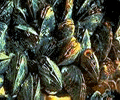Researchers in the
The new bio-pesticide was derived from a common soil bacterium by researchers at the New York State Museum (NYSM) Field Research Laboratory in
When ingested in large quantities, the bacterium is lethal to zebra and quagga mussels, but it is harmless to other organisms, including native freshwater molluscs.
In experimental treatments of zebra and quagga mussels, the bio-pesticide achieved a 98 per cent mortality rate in service water systems at a
Existing methods used by power-plant operators to control zebra and quagga mussels include chemical ‘molluscicides,’ chlorination, filtration and pre-oxidation of intake water. Use of the new bacterial toxin is economically competitive with these other methods, and the researchers expect that the application of the bacterial toxin will allow power-plant operators to reduce or eliminate the use of chlorination that can harm aquatic ecosystems.
Production of commercial quantities of the toxin is now being carried out at Marrone Organic Innovations (MOI), a private laboratory in

Zebra and quagga mussels grow in high density – here they have encrusted a current meter in




April 1886: the Brunkebergs tunnel
First ever example of a ground source heat pump?